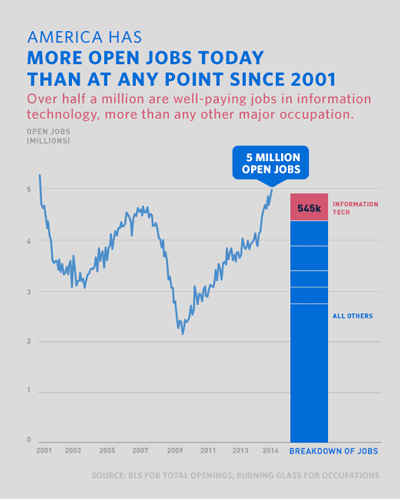Communications of the ACM
Ticket to Ride: Financing For Code Camp

As coding camps become more popular, new financing methods are arising to help potential students take advantage of them.
Credit: General Assembly
The fast track to high-tech success; a ticket to the middle class. Such mantras are being repeated by an expanding list of accelerated-learning computer coding schools, U.S. President Barack Obama, lenders, cities, and companies across the country.
Job seekers jumping into the hottest trend in technology education are finding increased financing options with which to buy a seat in what have become known as coding boot camps. These alternative schools provide a six- to 19-week regime of intensive daily training in computer coding at a price tag of $10,000 to $20,000. The allure includes the 90% (and higher) job placement claims made by leading code camp operators, the relatively short time investment, and the promise of starting pay of $65,000 to $100,000 per year. The approach has proven attractive to young adults with varied educational backgrounds, and to older students changing career paths.
The high demand for trained coders runs throughout President Obama’s TechHire Initiative announced in March; the White House press release launching the effort specifically mentions coding boot camps seven times. The initiative includes a $100-million Department of Labor grant competition to "fast-track" lower-skilled individuals to fill an estimated 545,000 open technology jobs in the U.S. Twenty first-round participating cities, local and national businesses, philanthropic organizations, and several coding camps have made commitments to expand grant and student financing options and opportunities, with the specific goals of ensuring the participation of women, minorities, the disabled, and veterans.

According to a survey of 67 coding schools based in the U.S. and Canada conducted by trade website Course Report and published in June, the number of graduates of U.S. coding camps will increase this year to more than 16,000, a 138% jump from 6,740 in 2014. In comparison, there were 48,700 undergraduate computer science graduates from accredited universities in the U.S. last year.
As the coding camp industry has quickly emerged, so has a funding gap. Traditional lenders have shied away from non-traditional education underwriting, and the boot camp students have not been eligible for government grants. In that void, a number of boot camp-focused loan companies have emerged. Earlier this month, Affirm completed an acquisition of LendLayer, which specialized in loans for accelerated learning programs. Others lenders actively pursuing boot camp clients include Climb, Earnest, Pave, Quotanda, Skills Fund, and UpStart.
"Millennials are kind of alienated from traditional banking relationships," said David Rosen, chief risk officer for Pave. "We’ve found that these potential clients and the courses have not been captured by traditional underwriting."
"People in boot camps are investing in their future," said Louis Beryl, co-founder and chief executive officer of Earnest. "Earnest really strives to lend to financially responsible people, so boot camp borrowers are right in our wheelhouse. We partner with the majority of the top boot camps—those in whose teaching and job placement we have high confidence."
According to Earnest, the average coding school student is 28.5 years old, and 63% are male. The students reported an average income of $45,000 before entering the coding program, and average starting salaries of $60,000 to $80,000 after completion. It also says its research indicates a healthy 94% of coding school students find employment within three months of graduating. Earnest will consider refinancing after new jobs are secured.
Within and around the fast-growing industry, a structure for providing grants and expanding creative financing options for the potential students has begun to take shape.
General Assembly, "an educational institution that transforms thinkers into creators through education in technology, business, and design" at campuses on four continents, has boot camps around the U.S. and in Europe. The organization has created the Opportunity Fund, a fellowship program that targets women, minorities, low-income individuals and veterans. Participants are required to volunteer 100 hours of community service using their new computing skills. General Assembly reports there have been 30 fellowships awarded to date with an associated 3,000 hours of volunteered service provided by participating graduates who garnered average salaries of $65,000.
Hack Reactor, based in San Francisco with a tagline of providing "the CS degree for the 21st century," touts a 99% hiring rate for its graduates and an average starting salary of $105,000. It offers an online coding camp called Remote Beta that allows eligible students to defer up to $15,000 of the total $17,780 cost until after graduation, with repayment set at approximately 1.4% of monthly income for every $1,000 deferred.
Dev Bootcamp, with schools in Chicago, New York, and San Francisco, has pledged to donate $425,000 in tuition in the next year to increase the participation of women and underrepresented minorities, reducing total tuition for the qualifying students from $13,000 to $1,000.
In support of the TechHire strategy, #YesWeCode, which targets urban, low-opportunity youth, is providing $10 million in coding boot camp scholarships over the next decade.
Underwriters will continue to keep a watchful eye on market risks as they monitor the rapid growth in boot camps and students. "You always remain concerned about attrition rates, job placement rates, and salaries. But the risk of saturation? We don’t see that at this time," said Pave’s Rosen.
Darrell Dunn is a freelance writer and editor based in the Dallas-Fort Worth area.
No entries found